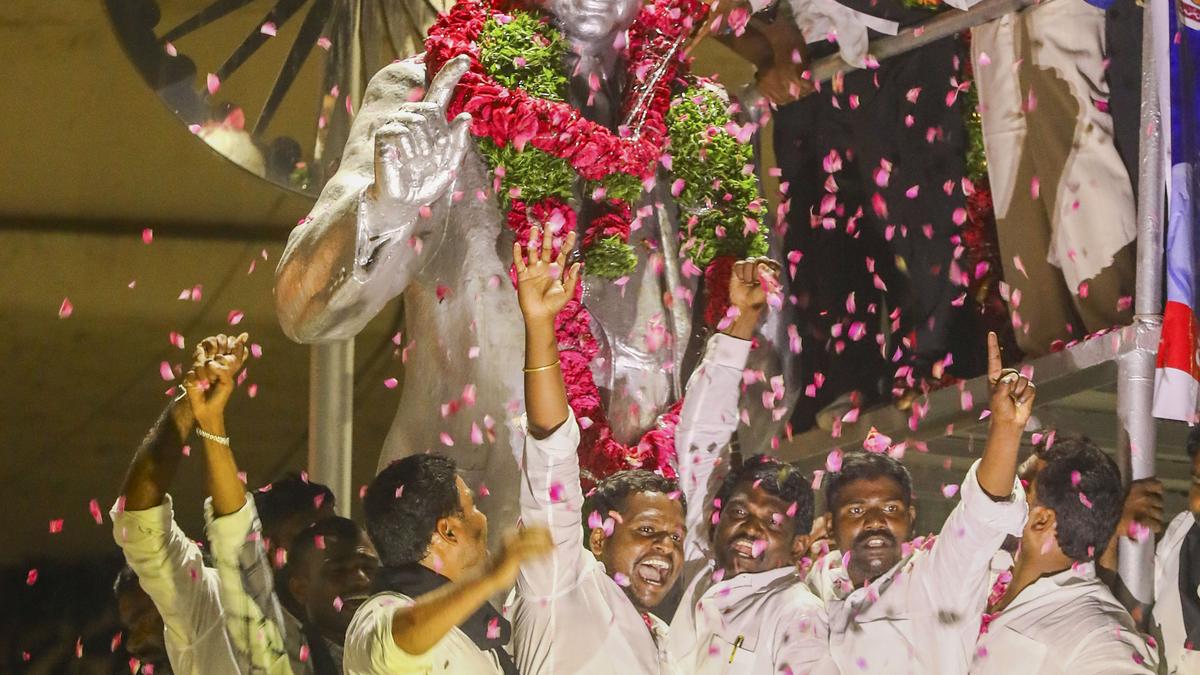Madiga Reservation Porata Samithi (MRPS) chief Manda Krishna Madiga pays tributes to B.R. Ambedkar, in Hyderabad.
| Photo Credit: PTI
On October 11, the Telangana government appointed the Justice Shameem Akhter Commission to study the details of sub-classification of Scheduled Castes (SCs) in Telangana and make recommendations to it. Earlier, in August this year, the Supreme Court had said that States could take a call on sub-categorisation, which involves classifying marginalised communities within SCs for more equitable distribution of benefits, addressing graded inequalities, and ensuring comprehensive representation.
Apart from having merely 60 days to complete its task, the one-man Commission faces a big challenge in the absence of Census data and data on castes. This was the same handicap that the B.N. Lokur Committee had also faced in 1965. As a result, it stopped short of recommending sub-categorisation. The committee concluded that the de-scheduling of advanced communities, such as the Malas, needed urgent consideration.
The Telangana government’s decision could not have come at a worse time for the disadvantaged communities among the SCs as it is currently on a hiring spree for government posts. The Madiga Reservation Porata Samithi (MRPS), which initiated the demand for sub-categorisation, has urged the government to appoint 11,000-odd teachers in the State only after sub-categorisation of SCs. A planned protest march in Hyderabad by MRPS leader Manda Krishna Madiga, demanding immediate implementation of sub-categorisation, was scuttled by the police. Mr. Madiga has spent four decades championing the cause by using Gandhian tactics such as fasts, silent protests, and marches.
It is a fact that discrimination against some of the communities classified as SCs continues to this day. In September, for instance, the Telangana High Court had to order police protection for a Madiga family in Medak district, about 40 kilometres from Hyderabad. The entire family had been ostracised by the Gram Sabha as two brothers who are a part of it did not want to be drum-beaters — the traditional occupation of the community — at a funeral in the village of Gowthojiguda in Medak. They are post-graduates and work in Hyderabad. The seriousness and persistence of discrimination can be seen from the frequent reports on the lack of access of certain communities to temples in Telangana.
Efforts to sub-classify SCs have been made in the past in the region. In erstwhile united Andhra Pradesh, the government led by Chandrababu Naidu had issued an ordinance in 1999 for SC sub-classification. In 2000, the Andhra Pradesh legislature passed the Andhra Pradesh Scheduled Castes (Rationalisation of Reservations) Act. It was implemented from 2000 to 2004. The SCs were divided into A (Relli), B (Madiga), C (Mala) and D (Others). Subsequently the Supreme Court struck this Act down, citing overreach by the State government.

The Andhra Pradesh Scheduled Castes (Rationalisation of Reservations) Act was clear about its goals: “The State shall endeavour to eliminate inequalities in status, facilities, and opportunities, not only amongst the individuals but also amongst groups of people residing in different areas or engaged in different vocations as enjoined under Article 38 (2) of Part IV Directive Principle of State Policy of the Constitution of India.” This law had provided 7% reservation for the group of castes that included the Madigas, who constitute 59.52% of the SCs in Telangana (Census 2011). It provided 6% reservation to the other SC communities, including the Malas (28.11% of the SC population).
The same measure of segmentation used in the 2000 Act could have been used for implementing reservations after the SC verdict, in Telangana. After all, the Census has not been conducted yet. Also, the Congress, which has been championing social justice, could have been seen to be walking the talk. Instead, it has chosen to constitute a one-man committee, which looks like a delaying tactic for sub-categorisation. Past committees, such as the B.N. Lokur Committee, the Justice Ramachandra Raju Commission, and the Justice Usha Mehra Commission, made recommendations which were implemented in a half-hearted manner. The Revanth Reddy government has failed to seize the opportunity presented by the Court’s verdict. The Justice Shameem Akhter Commission appears to be just another hurdle for the marginalised communities among the SCs.
Published – October 14, 2024 12:45 am IST

